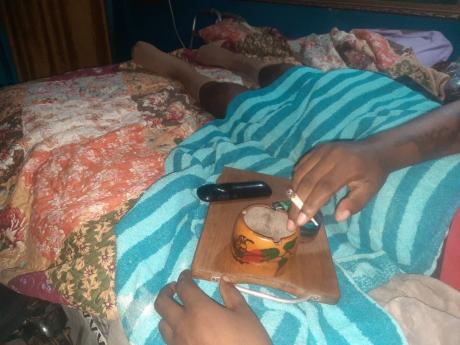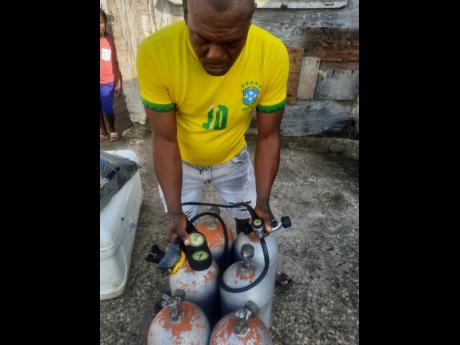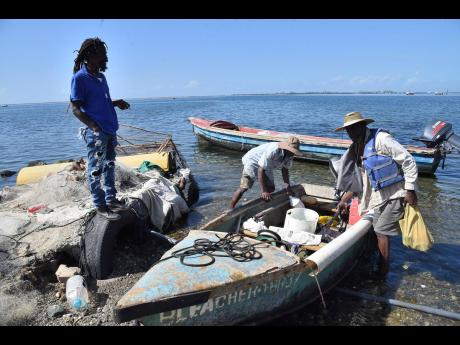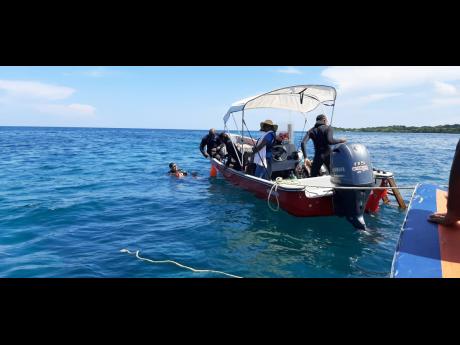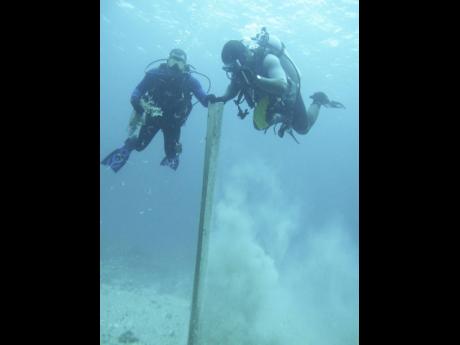Dangerous dives
• Decompression sickness a crippling blow to fishermen • Experts urge training as divers flout best practices in search of a better catch
Locked away inside a beach hovel, fisherman Mark Needham* flips television channels and puffs a marijuana spliff. These keep his mind off the fact that his very livelihood has caused him to be crippled from the waist down. Alas, his life at sea is...
Locked away inside a beach hovel, fisherman Mark Needham* flips television channels and puffs a marijuana spliff. These keep his mind off the fact that his very livelihood has caused him to be crippled from the waist down.
Alas, his life at sea is no more.
Although disabled for more than five years, the regrets fester, fuelled by a hard-taught lesson of being dependent on others to survive. He seldom answers calls at his door, let alone share how a severe hit with decompression sickness has left him unable to feel or operate the lower half of his body.
Outside, on one of three fishing villages in St Catherine that The Sunday Gleaner visited last week, his former colleagues return from the sea with spears and oxygen tanks in their hands. Others gas their boats as seagulls hovered overhead crying.
Needham couldn’t care less.
The veteran fisherman is among scores across the island who suffer from decompression sickness – a condition that results when too rapid decompression causes nitrogen bubbles to form in the tissues of the body. It is suffered particularly by untrained divers, who call it “bends”, most often from diving too deep or for too long. On the mild side, it can cause pain in the muscles and joints, cramps, numbness and nausea; while on the more severe side, it could lead to blindness, impotence, paralysis, and even death. According to experts, those most affected are untrained and undisciplined divers.
Last week, divers jokingly acted it out, twisting and limping in their strides. To the untrained eye, the mild form of bends is hard to see, but with the re-enactment, the frequency of the gait among the returning divers grew vivid.
Authorities fear that the opening of the lobster season in July may fuel an increase in the number of cases, as fishermen dive longer and more frequently in search of the elusive delicacy.
‘I JUST FEEL LIKE SOMETHING CUT ME IN MY BACK’
Needham, who had been diving for more than a decade when he was struck by decompression sickness, said that ill-fated day in June 2017 was like any other. That morning, in quick succession, he and others made three different dives, using up three tanks of oxygen, which typically lasts about half an hour each on deep dive of more than 100 feet.
It was when he resurfaced the third time that he realised that something was very wrong.
“When I went back into the boat, I saw one of the divers that I went down with vomiting blood. I didn’t understand how he swam back up so fast,” recounted the 30-odd-year-old, adding that he himself had been taking his time to decompress as he made his way back to the surface.
He said he sprang into action, starting the boat’s engine, and headed towards a nearby marker from which he had planned to shout for help. It was three of them in the boat at that time, and they did not reach far before he himself was hit with the sickness.
“I just feel like something cut me in my back, and after that, my eyesight was just gone, and my foot dem can’t move,” he shared with The Sunday Gleaner, admitting that he panicked and made some irrational decisions afterwards.
“I just cut the engine, tell the other guy to set up my tank and I just grabbed it and went back overboard. My intention was to just go back into the water to try to decompress,” he said.
Looking back, he believes God was on his side as he could have drifted blindly further from the boat and thus away from help; or the already depleted tank could have ran dry, leaving him without air to resurface. Neither happened.
Luckily, he regained sight shortly after being underwater and miraculously made his way back to the boat. Still, his legs were not working, and even after a stint at the Kingston Public Hospital, being airlifted to Discovery Bay, and numerous rehabilitation sessions, he is still paralysed.
Things became even tougher when his mother died a year after the incident, he said. She would take care of him, but now he has learned to wash his clothes at his bedside and keeps an electric kettle at arm’s length above his bed to make tea.
“I used to have rich friends that I look up to. Friends that if you say something bad about them it would be like you said something bad about me. Even they turned their back on me. Women have also turned their backs,” he said matter-of-factly, adding that it has affected him mentally. “I used to talk pure foolishness, but the weed, I think it made me firm in myself.”
Day-to-day survival is a drag, but “I have learned to separate my needs from my wants. So whatever money anybody gives me I know what to spend it on and what to save. That is just how I live my life,” he said, recalling days of partying, independence and happiness.
He hopes to one day purchase a boat wide enough to accommodate his disability and return to his love of life at sea.
QUITE COMMON AMONG JAMAICAN FISHERMEN
In Jamaica, the Peter Gayle Hyperbaric Facility in Discovery Bay, St Ann, treats victims of decompression sickness. Each year, they typically see a few mild cases affecting tourist divers and on average 13 local fishermen. However, the latter usually comes in when things are quite severe, they noted.
Camilo Trench, a trained diving instructor and academic coordinator at the University of the West Indies Discovery Bay Marine Laboratory, explained that mild decompression sickness is quite common among Jamaican fishermen.
In most cases, it is mild, goes untreated, and many times often overlooked by doctors who prescribe painkillers. In other circumstances, however, it gets worse, he said, adding that the severity of ‘bends’ is dependent on a diver’s age and health. Tourist patients, who are usually under the supervision of trained diving instructors, often have underlying health issues.
Divers interviewed by The Sunday Gleaner claimed that they were afflicted following overindulgence in sex, alcohol, and marijuana before dives.
“There are rules to diving and the fishermen don’t learn those rules when they are diving. Most times it is just a bredren teaching them how to dive. They don’t learn physics and the chemistry of diving,” Trench told The Sunday Gleaner, explaining that a dive to more than 100 feet should not last more than 20 minutes.
“But the typical fisherman, when he is hunting for lobster and fish, is ruthless. He will do three, or four dives in the space of two hours. They will do a two-hour dive to 100 or 200 feet,” he said. “So they don’t stick to the rules and that’s what is damaging them.”
Some patients, he said, enter the facility paralysed, are treated, and walk out after a five-hour session. Others, like Needham, however, never walk again, even after repeated treatments.
Some ‘bends’ victims end up at the Sir John Golding Rehabilitation Centre in Mona for treatment, but last week Dr Rory Dixon, the senior medical officer there, said the facility, which treats a host of gunshot victims, among others, has seen about five cases of decompression sickness in recent years.
Needham was slated for regular therapy at the centre but said a lack of assistance with transportation has caused him to miss his appointments, rendering his lower limbs stiff.
‘TRAINING IS IMPORTANT’
Last August, the National Fisheries Authority (NFA) embarked on a $6-million, five-year Safety at Sea programme, starting with 35 Jamaicans from the industry who were afforded equipment and training on how to deal with mishaps, including decompression sickness, at sea.
“We have had great feedback from those who have had the training. They did not know about certain safety procedures that should have been followed, especially for the divers. Currently, we are reviewing the contract with the Caribbean Maritime University and the Discovery Bay Marine Lab, and then we are going to continue the programme,” said Shellene Berry, a fisheries management specialist at NFA.
According to the NFA’s compliance department, there are not many regulations specific to diving within the industry. Except for minimal fishing fees amounting to about $2,000, and other boating fees, there is no law against fishermen diving in their home waters.
Fishing villages in Jamaica have been a haven for youngsters who opt out of classrooms for an easy, honest way of living. In 2019, some 25 per cent of fifth-form dropouts at Bustamante High School in Clarendon did so to hustle on nearby fishing beaches.
Berry said the hope is that the message will filter through those who have been trained.
“That is why the training is important, so they can go back into the communities and train others. It is not that they will be certified but at least the knowledge will be passed on and best practices developed for their safety,” said the specialist.
COSTLY TREATMENT
Trench said decompression sickness can cost foreigners US$6,000 (J$927,000) to treat, while Jamaican fishermen pay roughly $143,000. Dependent on where they are located on the island, persons may have to be airlifted at an additional cost, usually around $1 million.
In most cases, fishermen like Needham, he said, are able to come up with the money, while in other instances, health regions that are less burdened will pay for treatment.
As there has been no take-up of the Safety Net Insurance Policy launched two years ago to provide coverage for registered fisherfolk vessels, it is not clear what health protection divers have against such illnesses caused at sea. Besides, several of the vessels used on the fishing beaches visited by The Sunday Gleaner were unregistered.
The insurance programme may have failed because of laps in public education campaigns, a source close to the scheme offered by Advantage General Insurance Company disclosed earlier this month.
“After it was launched, we went around the island because we have salespersons, and we went to a number of those locations for meetings ... but, of course, the guys were not going to keep going if they were not getting anything from it,” said the source.
[*Name changed to protect identity]
DECOMPRESSION SICKNESS OR ‘BENDS’
• A condition that results when too rapid decompression causes nitrogen bubbles to form in the tissues of the body.
• It is suffered particularly by untrained divers most often from diving too deep or for too long.
• Symptoms may include pain in the muscles and joints, cramp, numbness, nausea blindness, impotence, paralysis, and even death.

